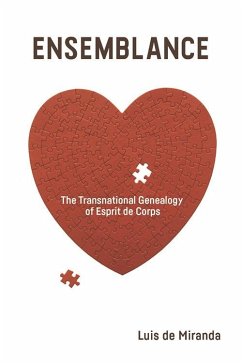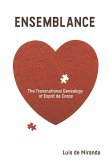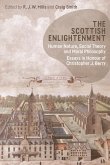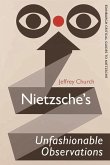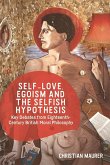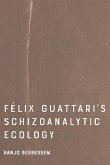0,00 €
0,00 €
inkl. MwSt.
Sofort per Download lieferbar

0 °P sammeln
0,00 €
Als Download kaufen

0,00 €
inkl. MwSt.
Sofort per Download lieferbar

0 °P sammeln
Jetzt verschenken
Alle Infos zum eBook verschenken
0,00 €
inkl. MwSt.
Sofort per Download lieferbar
Alle Infos zum eBook verschenken

0 °P sammeln
- Format: PDF
- Merkliste
- Auf die Merkliste
- Bewerten Bewerten
- Teilen
- Produkt teilen
- Produkterinnerung
- Produkterinnerung

Bitte loggen Sie sich zunächst in Ihr Kundenkonto ein oder registrieren Sie sich bei
bücher.de, um das eBook-Abo tolino select nutzen zu können.
Hier können Sie sich einloggen
Hier können Sie sich einloggen
Sie sind bereits eingeloggt. Klicken Sie auf 2. tolino select Abo, um fortzufahren.

Bitte loggen Sie sich zunächst in Ihr Kundenkonto ein oder registrieren Sie sich bei bücher.de, um das eBook-Abo tolino select nutzen zu können.
Esprit de corps has played a significant role in the cultural and political history of the last 300 years. Through several historical case studies, Luis de Miranda shows how this phrase acts as a combat concept with a clear societal impact. He also reveals how interconnected, yet distinct, French, English and American modern intellectual and political thought is. In the end, this is a cautionary analysis of past and current ideologies of ultra-unified human ensembles, a recurrent historical and theoretical fabulation the author calls 'ensemblance'.
- Geräte: PC
- mit Kopierschutz
- eBook Hilfe
- Größe: 1.65MB
- FamilySharing(5)
Andere Kunden interessierten sich auch für
![Cosmo-nationalism (eBook, PDF) Cosmo-nationalism (eBook, PDF)]() Oisin KeohaneCosmo-nationalism (eBook, PDF)0,00 €
Oisin KeohaneCosmo-nationalism (eBook, PDF)0,00 €![Ensemblance (eBook, ePUB) Ensemblance (eBook, ePUB)]() Luis De MirandaEnsemblance (eBook, ePUB)20,95 €
Luis De MirandaEnsemblance (eBook, ePUB)20,95 €![Scottish Enlightenment (eBook, PDF) Scottish Enlightenment (eBook, PDF)]() Scottish Enlightenment (eBook, PDF)20,95 €
Scottish Enlightenment (eBook, PDF)20,95 €![Nietzsche's Unfashionable Observations (eBook, PDF) Nietzsche's Unfashionable Observations (eBook, PDF)]() Jeffrey ChurchNietzsche's Unfashionable Observations (eBook, PDF)0,00 €
Jeffrey ChurchNietzsche's Unfashionable Observations (eBook, PDF)0,00 €![Self-love, Egoism and the Selfish Hypothesis (eBook, PDF) Self-love, Egoism and the Selfish Hypothesis (eBook, PDF)]() Christian MaurerSelf-love, Egoism and the Selfish Hypothesis (eBook, PDF)0,00 €
Christian MaurerSelf-love, Egoism and the Selfish Hypothesis (eBook, PDF)0,00 €![Marquis de Sade and Continental Philosophy (eBook, PDF) Marquis de Sade and Continental Philosophy (eBook, PDF)]() Lode LauwaertMarquis de Sade and Continental Philosophy (eBook, PDF)0,00 €
Lode LauwaertMarquis de Sade and Continental Philosophy (eBook, PDF)0,00 €![Felix Guattari's Schizoanalytic Ecology (eBook, PDF) Felix Guattari's Schizoanalytic Ecology (eBook, PDF)]() Hanjo BerressemFelix Guattari's Schizoanalytic Ecology (eBook, PDF)0,00 €
Hanjo BerressemFelix Guattari's Schizoanalytic Ecology (eBook, PDF)0,00 €-
-
-
Esprit de corps has played a significant role in the cultural and political history of the last 300 years. Through several historical case studies, Luis de Miranda shows how this phrase acts as a combat concept with a clear societal impact. He also reveals how interconnected, yet distinct, French, English and American modern intellectual and political thought is. In the end, this is a cautionary analysis of past and current ideologies of ultra-unified human ensembles, a recurrent historical and theoretical fabulation the author calls 'ensemblance'.
Dieser Download kann aus rechtlichen Gründen nur mit Rechnungsadresse in A, B, BG, CY, CZ, D, DK, EW, E, FIN, F, GR, HR, H, IRL, I, LT, L, LR, M, NL, PL, P, R, S, SLO, SK ausgeliefert werden.
Produktdetails
- Produktdetails
- Verlag: Edinburgh University Press
- Erscheinungstermin: 7. Januar 2020
- Englisch
- ISBN-13: 9781474454223
- Artikelnr.: 72419134
- Verlag: Edinburgh University Press
- Erscheinungstermin: 7. Januar 2020
- Englisch
- ISBN-13: 9781474454223
- Artikelnr.: 72419134
- Herstellerkennzeichnung Die Herstellerinformationen sind derzeit nicht verfügbar.
Luis de Miranda is Researcher in the History of Ideas Department at Örebro University, Sweden. He is the author of Being and Neonness (MIT Press, 2019), Peut-on jouir du capitalisme? Lacan avec Heidegger et Marx (Max Milo, 2009) and Une vie nouvelle est-elle possible? Deleuze et les lignes (Nous, 2009).
Esprit de Corps: A Timeline
Introduction. A Thousand Platoons: The Enduring Importance of Esprit de
Corps
* Team Spirits: Twenty-First Century Uses of 'Esprit de Corps'
* Knowledge Aperture: Academic Literature on Esprit de Corps
* Abstract Universalism: The Problem of a Philosophical Perspective
When Studying Esprit de Corps
* As Far as We Can Tell: A Longue Durée Intellectual History of the
Uses of 'Esprit de Corps'
* Surveying Large Issues Within a Small Compass: Digital Genealogy
1. Musketeers and Jesuits: The French Birth of 'Esprit de Corps' in the
Eighteenth Century
* Not Only in the Military: First Occurrences of the Phrase in Print
* The Head of the World: A Short Prehistory of the Phrase 'Esprit de
Corps'
* One Hundred Fifty: A Quantification of Esprit de Corps?
* Bad Grafts: Critical Uses of 'Esprit de Corps' in the Encyclopédie
* Too Zealous to Be Honest? The Trial of the Jesuits
2. Adunation of the Nation: Towards a Republican Esprit de Corps
* The Mask of Reason: Dialectics of Particularism and Patriotism
* Collective Cogito: The Nation as a Natural and Spiritual Corps
* Capitalism versus Esprit de Corps: The Suppression of the Corps de
Métiers
* Common Good: Revolution and the 'Adunation' of Society
3. We Must Hang Together: The English Appropriation of Esprit de Corps in
the Eighteenth and Nineteenth Centuries
* Exotic Flavour and Distinction: Linguistic and Semantic Observations
* Unavoidable Zeal: Early Propagation of EdC in British English
* The Honour of a Nation: Official Debates about EdC in the UK and the
USA
* The Natural Bond: Universalist and Familial Esprit de Corps
4. The Way of Napoleon: The Uniformization of Esprit de Corps in Early
Nineteenth-Century France
* Superiorly Normal: Renewal and Normalization of Esprit de Corps
* Esprit de Corporation: The Decline of Labour Communities and the
Spread of Individualist Competition
* The Honour and Duty of the Soldier
* Defend Your Flag: Napoleonic Esprit de Corps
* The Cement of the Social Edifice: The Counter-Revolutionary Praise of
Esprit de Corps
5. Collective Temperament: Esprit de Corps as Sociality and Individuation
in the Second Half of the Nineteenth Century
* Whose Norms? Conformative Esprit de Corps and Autonomist Esprit de
Corps
* 'We Who Suffer': The Problematic Regulation of Solidarities
* Esprit de Corps and The Spirit of Individuality: Tocqueville's
Reminiscence
* Esprit de Corps and the First French Sociologists: Fourier, Tarde,
Durkheim
* Self-Alienation: The Individualistic critique of Esprit de Corps
6. The Mystique of Esprit de Corps in France in the Twentieth Century
* The Moral Empire: Permanence of the Ambiguity of Esprit de Corps in
French
* The Superior Self: Esprit de Corps as Honour in Terraillon and
Bergson
* Professional Habitus: French Esprit de Corps in Work, Management and
French Education
* Esprit de Corps as a War Machine: From De Gaulle to Deleuze
* The future of a Gallicism: Canada as a Semantic Border Between French
and English
7. The Way of Hilton: Esprit de Corps in the UK and the USA in the
Twentieth Century
* 'A Happy Phrase': The Specificity of English Uses of 'Esprit de Corps
'
* Brothers in Arms: Esprit de Corps in Military Discourse
* The Purpose of Unity: Political and Institutional Aspects of Esprit
de Corps
* Measure by Measure: Intellectual and Theoretical Uses of 'Esprit de
Corps'
* The Management of Men: Corporate and Managerial Discourse
Conclusion: Ensemblance
* 'Large issues within a small compass': Histosophy
* Is a General Theory of Esprit de Corps Possible?
* Drive, Discipline, Duty and Distinction: Four Scales of Esprit de
Corps?
* The Contigency of Ensembles: Six Questions Raised and Answered
Bibliography
Index
Introduction. A Thousand Platoons: The Enduring Importance of Esprit de
Corps
* Team Spirits: Twenty-First Century Uses of 'Esprit de Corps'
* Knowledge Aperture: Academic Literature on Esprit de Corps
* Abstract Universalism: The Problem of a Philosophical Perspective
When Studying Esprit de Corps
* As Far as We Can Tell: A Longue Durée Intellectual History of the
Uses of 'Esprit de Corps'
* Surveying Large Issues Within a Small Compass: Digital Genealogy
1. Musketeers and Jesuits: The French Birth of 'Esprit de Corps' in the
Eighteenth Century
* Not Only in the Military: First Occurrences of the Phrase in Print
* The Head of the World: A Short Prehistory of the Phrase 'Esprit de
Corps'
* One Hundred Fifty: A Quantification of Esprit de Corps?
* Bad Grafts: Critical Uses of 'Esprit de Corps' in the Encyclopédie
* Too Zealous to Be Honest? The Trial of the Jesuits
2. Adunation of the Nation: Towards a Republican Esprit de Corps
* The Mask of Reason: Dialectics of Particularism and Patriotism
* Collective Cogito: The Nation as a Natural and Spiritual Corps
* Capitalism versus Esprit de Corps: The Suppression of the Corps de
Métiers
* Common Good: Revolution and the 'Adunation' of Society
3. We Must Hang Together: The English Appropriation of Esprit de Corps in
the Eighteenth and Nineteenth Centuries
* Exotic Flavour and Distinction: Linguistic and Semantic Observations
* Unavoidable Zeal: Early Propagation of EdC in British English
* The Honour of a Nation: Official Debates about EdC in the UK and the
USA
* The Natural Bond: Universalist and Familial Esprit de Corps
4. The Way of Napoleon: The Uniformization of Esprit de Corps in Early
Nineteenth-Century France
* Superiorly Normal: Renewal and Normalization of Esprit de Corps
* Esprit de Corporation: The Decline of Labour Communities and the
Spread of Individualist Competition
* The Honour and Duty of the Soldier
* Defend Your Flag: Napoleonic Esprit de Corps
* The Cement of the Social Edifice: The Counter-Revolutionary Praise of
Esprit de Corps
5. Collective Temperament: Esprit de Corps as Sociality and Individuation
in the Second Half of the Nineteenth Century
* Whose Norms? Conformative Esprit de Corps and Autonomist Esprit de
Corps
* 'We Who Suffer': The Problematic Regulation of Solidarities
* Esprit de Corps and The Spirit of Individuality: Tocqueville's
Reminiscence
* Esprit de Corps and the First French Sociologists: Fourier, Tarde,
Durkheim
* Self-Alienation: The Individualistic critique of Esprit de Corps
6. The Mystique of Esprit de Corps in France in the Twentieth Century
* The Moral Empire: Permanence of the Ambiguity of Esprit de Corps in
French
* The Superior Self: Esprit de Corps as Honour in Terraillon and
Bergson
* Professional Habitus: French Esprit de Corps in Work, Management and
French Education
* Esprit de Corps as a War Machine: From De Gaulle to Deleuze
* The future of a Gallicism: Canada as a Semantic Border Between French
and English
7. The Way of Hilton: Esprit de Corps in the UK and the USA in the
Twentieth Century
* 'A Happy Phrase': The Specificity of English Uses of 'Esprit de Corps
'
* Brothers in Arms: Esprit de Corps in Military Discourse
* The Purpose of Unity: Political and Institutional Aspects of Esprit
de Corps
* Measure by Measure: Intellectual and Theoretical Uses of 'Esprit de
Corps'
* The Management of Men: Corporate and Managerial Discourse
Conclusion: Ensemblance
* 'Large issues within a small compass': Histosophy
* Is a General Theory of Esprit de Corps Possible?
* Drive, Discipline, Duty and Distinction: Four Scales of Esprit de
Corps?
* The Contigency of Ensembles: Six Questions Raised and Answered
Bibliography
Index
Esprit de Corps: A Timeline
Introduction. A Thousand Platoons: The Enduring Importance of Esprit de
Corps
* Team Spirits: Twenty-First Century Uses of 'Esprit de Corps'
* Knowledge Aperture: Academic Literature on Esprit de Corps
* Abstract Universalism: The Problem of a Philosophical Perspective
When Studying Esprit de Corps
* As Far as We Can Tell: A Longue Durée Intellectual History of the
Uses of 'Esprit de Corps'
* Surveying Large Issues Within a Small Compass: Digital Genealogy
1. Musketeers and Jesuits: The French Birth of 'Esprit de Corps' in the
Eighteenth Century
* Not Only in the Military: First Occurrences of the Phrase in Print
* The Head of the World: A Short Prehistory of the Phrase 'Esprit de
Corps'
* One Hundred Fifty: A Quantification of Esprit de Corps?
* Bad Grafts: Critical Uses of 'Esprit de Corps' in the Encyclopédie
* Too Zealous to Be Honest? The Trial of the Jesuits
2. Adunation of the Nation: Towards a Republican Esprit de Corps
* The Mask of Reason: Dialectics of Particularism and Patriotism
* Collective Cogito: The Nation as a Natural and Spiritual Corps
* Capitalism versus Esprit de Corps: The Suppression of the Corps de
Métiers
* Common Good: Revolution and the 'Adunation' of Society
3. We Must Hang Together: The English Appropriation of Esprit de Corps in
the Eighteenth and Nineteenth Centuries
* Exotic Flavour and Distinction: Linguistic and Semantic Observations
* Unavoidable Zeal: Early Propagation of EdC in British English
* The Honour of a Nation: Official Debates about EdC in the UK and the
USA
* The Natural Bond: Universalist and Familial Esprit de Corps
4. The Way of Napoleon: The Uniformization of Esprit de Corps in Early
Nineteenth-Century France
* Superiorly Normal: Renewal and Normalization of Esprit de Corps
* Esprit de Corporation: The Decline of Labour Communities and the
Spread of Individualist Competition
* The Honour and Duty of the Soldier
* Defend Your Flag: Napoleonic Esprit de Corps
* The Cement of the Social Edifice: The Counter-Revolutionary Praise of
Esprit de Corps
5. Collective Temperament: Esprit de Corps as Sociality and Individuation
in the Second Half of the Nineteenth Century
* Whose Norms? Conformative Esprit de Corps and Autonomist Esprit de
Corps
* 'We Who Suffer': The Problematic Regulation of Solidarities
* Esprit de Corps and The Spirit of Individuality: Tocqueville's
Reminiscence
* Esprit de Corps and the First French Sociologists: Fourier, Tarde,
Durkheim
* Self-Alienation: The Individualistic critique of Esprit de Corps
6. The Mystique of Esprit de Corps in France in the Twentieth Century
* The Moral Empire: Permanence of the Ambiguity of Esprit de Corps in
French
* The Superior Self: Esprit de Corps as Honour in Terraillon and
Bergson
* Professional Habitus: French Esprit de Corps in Work, Management and
French Education
* Esprit de Corps as a War Machine: From De Gaulle to Deleuze
* The future of a Gallicism: Canada as a Semantic Border Between French
and English
7. The Way of Hilton: Esprit de Corps in the UK and the USA in the
Twentieth Century
* 'A Happy Phrase': The Specificity of English Uses of 'Esprit de Corps
'
* Brothers in Arms: Esprit de Corps in Military Discourse
* The Purpose of Unity: Political and Institutional Aspects of Esprit
de Corps
* Measure by Measure: Intellectual and Theoretical Uses of 'Esprit de
Corps'
* The Management of Men: Corporate and Managerial Discourse
Conclusion: Ensemblance
* 'Large issues within a small compass': Histosophy
* Is a General Theory of Esprit de Corps Possible?
* Drive, Discipline, Duty and Distinction: Four Scales of Esprit de
Corps?
* The Contigency of Ensembles: Six Questions Raised and Answered
Bibliography
Index
Introduction. A Thousand Platoons: The Enduring Importance of Esprit de
Corps
* Team Spirits: Twenty-First Century Uses of 'Esprit de Corps'
* Knowledge Aperture: Academic Literature on Esprit de Corps
* Abstract Universalism: The Problem of a Philosophical Perspective
When Studying Esprit de Corps
* As Far as We Can Tell: A Longue Durée Intellectual History of the
Uses of 'Esprit de Corps'
* Surveying Large Issues Within a Small Compass: Digital Genealogy
1. Musketeers and Jesuits: The French Birth of 'Esprit de Corps' in the
Eighteenth Century
* Not Only in the Military: First Occurrences of the Phrase in Print
* The Head of the World: A Short Prehistory of the Phrase 'Esprit de
Corps'
* One Hundred Fifty: A Quantification of Esprit de Corps?
* Bad Grafts: Critical Uses of 'Esprit de Corps' in the Encyclopédie
* Too Zealous to Be Honest? The Trial of the Jesuits
2. Adunation of the Nation: Towards a Republican Esprit de Corps
* The Mask of Reason: Dialectics of Particularism and Patriotism
* Collective Cogito: The Nation as a Natural and Spiritual Corps
* Capitalism versus Esprit de Corps: The Suppression of the Corps de
Métiers
* Common Good: Revolution and the 'Adunation' of Society
3. We Must Hang Together: The English Appropriation of Esprit de Corps in
the Eighteenth and Nineteenth Centuries
* Exotic Flavour and Distinction: Linguistic and Semantic Observations
* Unavoidable Zeal: Early Propagation of EdC in British English
* The Honour of a Nation: Official Debates about EdC in the UK and the
USA
* The Natural Bond: Universalist and Familial Esprit de Corps
4. The Way of Napoleon: The Uniformization of Esprit de Corps in Early
Nineteenth-Century France
* Superiorly Normal: Renewal and Normalization of Esprit de Corps
* Esprit de Corporation: The Decline of Labour Communities and the
Spread of Individualist Competition
* The Honour and Duty of the Soldier
* Defend Your Flag: Napoleonic Esprit de Corps
* The Cement of the Social Edifice: The Counter-Revolutionary Praise of
Esprit de Corps
5. Collective Temperament: Esprit de Corps as Sociality and Individuation
in the Second Half of the Nineteenth Century
* Whose Norms? Conformative Esprit de Corps and Autonomist Esprit de
Corps
* 'We Who Suffer': The Problematic Regulation of Solidarities
* Esprit de Corps and The Spirit of Individuality: Tocqueville's
Reminiscence
* Esprit de Corps and the First French Sociologists: Fourier, Tarde,
Durkheim
* Self-Alienation: The Individualistic critique of Esprit de Corps
6. The Mystique of Esprit de Corps in France in the Twentieth Century
* The Moral Empire: Permanence of the Ambiguity of Esprit de Corps in
French
* The Superior Self: Esprit de Corps as Honour in Terraillon and
Bergson
* Professional Habitus: French Esprit de Corps in Work, Management and
French Education
* Esprit de Corps as a War Machine: From De Gaulle to Deleuze
* The future of a Gallicism: Canada as a Semantic Border Between French
and English
7. The Way of Hilton: Esprit de Corps in the UK and the USA in the
Twentieth Century
* 'A Happy Phrase': The Specificity of English Uses of 'Esprit de Corps
'
* Brothers in Arms: Esprit de Corps in Military Discourse
* The Purpose of Unity: Political and Institutional Aspects of Esprit
de Corps
* Measure by Measure: Intellectual and Theoretical Uses of 'Esprit de
Corps'
* The Management of Men: Corporate and Managerial Discourse
Conclusion: Ensemblance
* 'Large issues within a small compass': Histosophy
* Is a General Theory of Esprit de Corps Possible?
* Drive, Discipline, Duty and Distinction: Four Scales of Esprit de
Corps?
* The Contigency of Ensembles: Six Questions Raised and Answered
Bibliography
Index
